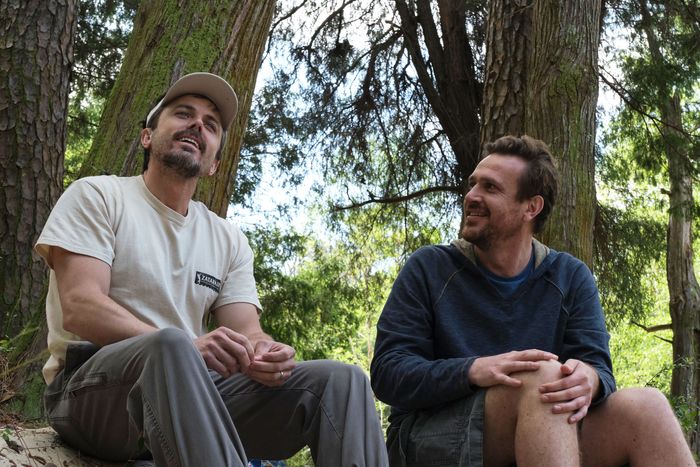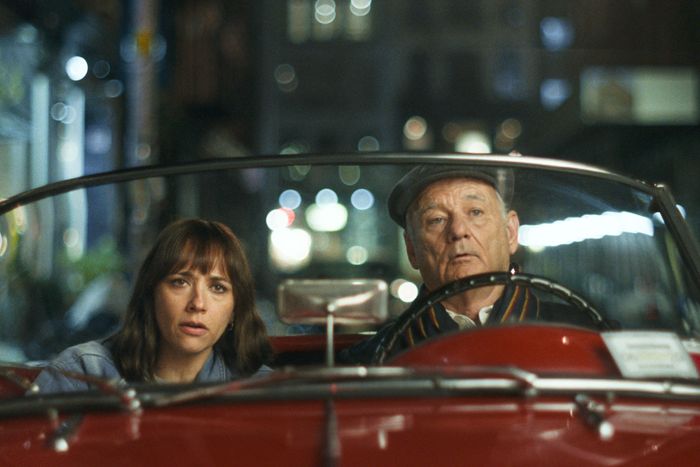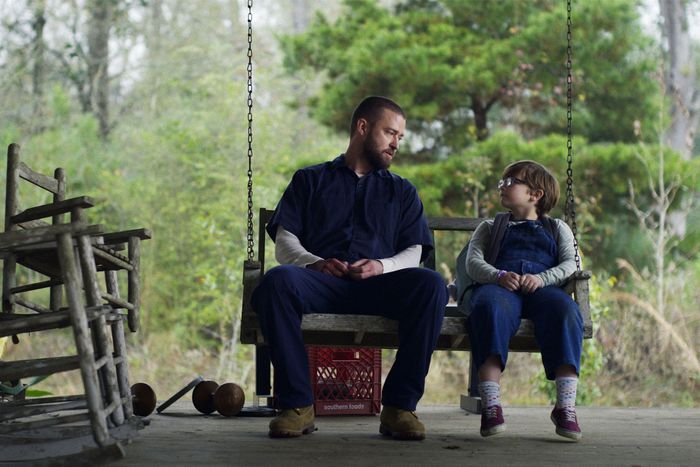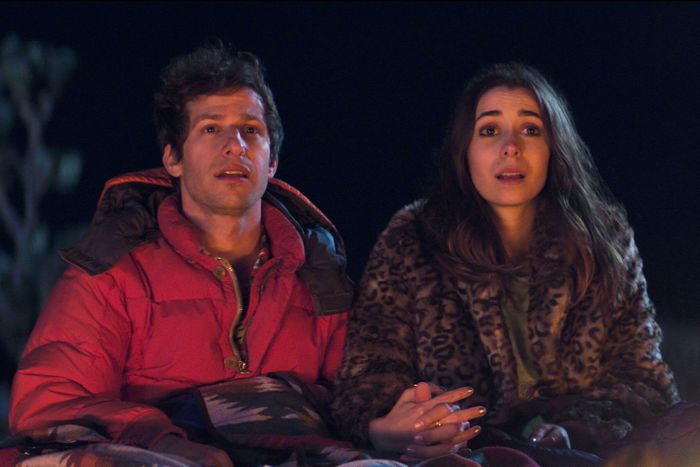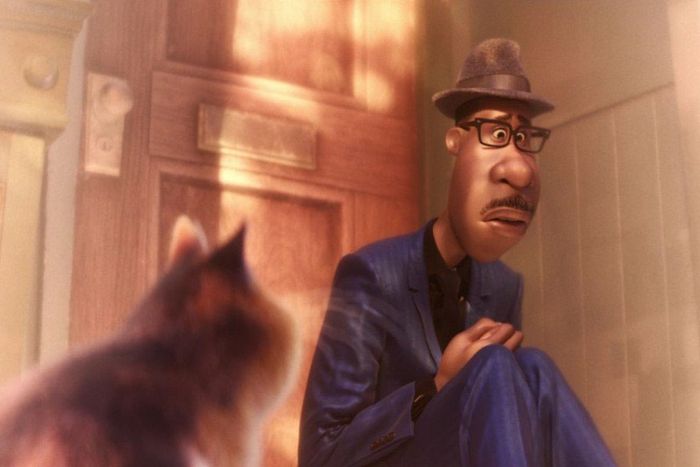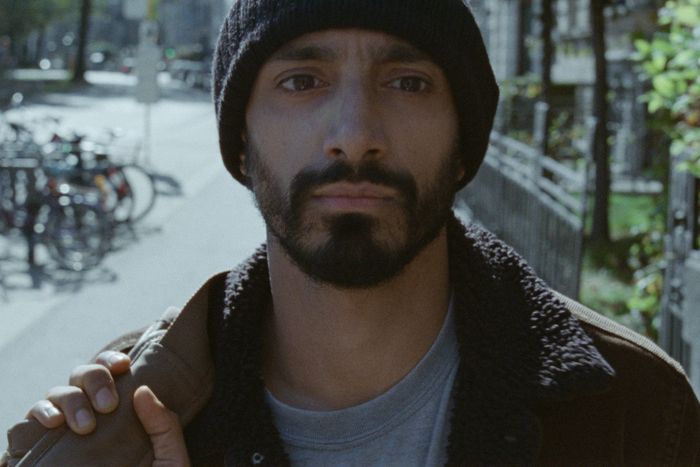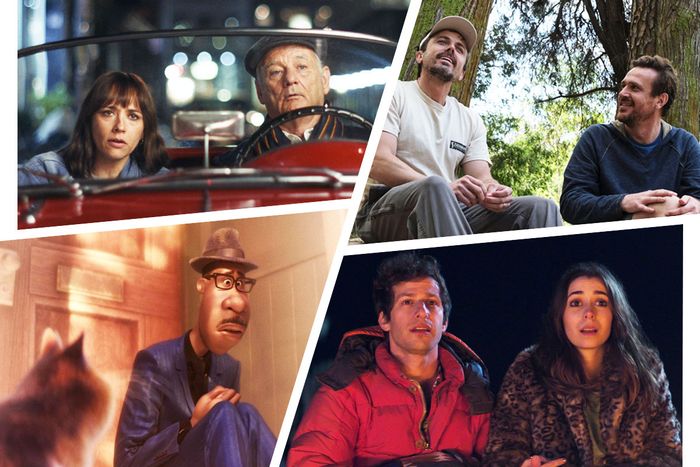
For filmmakers, the ending can be the most arduous part of moviemaking. Writing and shooting one often involves constant workshopping, tossed-off drafts, inner turmoil, and finally just deciding, “This is it, and I hope people enjoy it in some way.”
“A filmmaker who’s not obsessed with endings? I can’t imagine any,” says Sound of Metal director Darius Marder. “You can have a wonderful movie, but if you don’t land it, it really doesn’t work.” Indeed, it’s hard to imagine Sound of Metal garnering Oscar nominations for Best Picture and Best Original Screenplay if Marder had chosen to close with anything other than Riz Ahmed sitting alone in that park, silently contemplating whether or not he was better off with his hearing implants (a saccharine ending after the film’s heightened intensity and Ruben’s deceit would’ve left viewers and Academy voters feeling a bit cheated).
To learn more about the art of ending a movie, Vulture spoke with Marder and five other writers who wrestled with the finales of their recent films. From stories of redemption, loss, and marital fidelity to high-concept comedic and animated films about the meaning of life, here’s how they toiled over the payoffs to their scripts and, in a few cases, put themselves in contention for awards gold this year.
Brad Ingelsby, Our Friend
Based on an award-winning Esquire story, Our Friend stars Casey Affleck as Matthew Teague, a journalist whose wife Nicole (Dakota Johnson) is dying of cancer. The story, though, revolves around the loyalty of their old friend Dane (Jason Segel), who selflessly moves in to help the couple and their daughters get through the ordeal. Like the article it’s based on, the film ends not with Nicole’s death but with a brief goodbye as Dane leaves to restart his life and Matthew, folding laundry, musters the strength to continue his own. For Ingelsby, it was a fine line to walk with truth versus fiction.
I was trying to come up with an ending that served the theme of the film, which was really the value of a friendship like this, which can get you through a difficult time — how certain friends stick around, and others can move away, and what that means to people. With that ending, you had a moment with Matt alone. The friend has left; he’s on his own again. It was a moment of appreciation of how much Dane had given him.
To be honest, I was so scared of that moment. Everyone who watches a movie of their life is going to say, “Well, it’s not me,” or they’re not going to be happy with the portrayal. I would make Matt read every ten pages of the script. I was always getting his stamp of approval. It was like, “Is this real, Matt? Is this what happened? Am I going to get your blessing?” He was such a trouper. If I was ever veering off from the truth in any way, he was always there to reel me in.
I don’t remember if that scene at the end of the movie really happened. I remember Matt saying to me, “I think Dane was trying to almost sneak away, like he didn’t know how to say goodbye.” That’s a nugget of information I can turn into something meaningful. How do we take that idea and turn it into a theme that then reflects back on the theme of the movie, this great friendship of these three people? I was trying to be respectful of the truth and what really happened and also trying to understand that an audience needs an ending. In real life, there aren’t often endings. Things don’t happen the way they do in movies. There’s not this great shot, there’s not this great hug, there’s not this great goodbye. In real life, it’s messier.
Sofia Coppola, On the Rocks
The director’s latest film follows Laura (Rashida Jones) going on a detective mission with her gadabout father Felix (Bill Murray), to find out whether or not her husband Dean (Marlon Wayans) is cheating on her. Eventually, Laura discovers that Dean is just working extra hard to provide for her and their children, while making amends with Felix, whose wanderlust and adulterous lifestyle created a rift in their family.
Endings are tricky. I usually have an idea of the starting point and where it’s going, but I don’t really find the ending until I get there, as I write it. For this, I struggled with the ending and had drafts that were really different than what I ended up with. I worked on my script, off and on, for over five years. I had a version that had a totally different outcome with the relationship of the couple. Originally, the couple doesn’t end up together because it was based on a friend’s situation, so I wrote about that story. But then I thought a story about a family breaking up would be depressing. That’s not the movie I wanted to make.
I knew going into it that at the end Felix wouldn’t change, but that Rashida and Bill’s characters would have some new understanding — she would make the decision to grow up, as far as their relationship. I originally wanted to see him on the QE2, sailing off into the sunset, but we skipped that.
My dad always talked about act structure. In all my scripts, there’s a loose three-act structure: “In the first act, the characters go up the tree. The second act, you throw rocks at them, and in the third act, they come down from the tree.” That’s my basic template.
I went in trying to do a romantic comedy. It’s so much about male and female points of view through generations, and I wanted them to connect instead of it being a bummer that they’re disconnected. [I wanted] to show how relationships go through ups and downs, and that you can reconnect — even though, at the time, when you’re feeling disconnected, at least to me, it’s the end of the world. Then, you get through it, clear it up, and it’s just as bright as ever. So I was trying look at those realities and I like to think that their lives go on.
It’s nice to end on a romantic, hopeful note. It was also my tribute to Sixteen Candles with the birthday cake. That’s one of my favorite endings.
Cheryl Guerriero, Palmer
The title character, played by Justin Timberlake, is a Louisiana ex-con who ends up being the caretaker of Sam (Ryder Allen), a 7-year-old boy who loves princesses and makeup, and was abandoned by his drug-addicted mother Shelly (Juno Temple). The film, the script of which was on the 2016 Black List of the best unmade movies in Hollywood, ends with Palmer — after scrapes with homophobes, the local police, and Shelly — getting custody of Sam while starting a relationship with the child’s teacher, Ms. Maggie.
When you talk about endings, one of the hardest things for me was we shot this at the end of 2019 and then, in 2020, I’m like, Wait a second. I don’t get to revise or anything? That was hard, because I was with the story for ten years.
I always knew Sam was going to get the Penelope’s Flying Princess certificate, but what was difficult was with Maggie and whether or not she and Palmer were going to end up together. In the first, very first, draft, a producer said I wrapped it up too much in a nice bow. It was like, “Do you want it ambiguous or not?” I always fought for them being together.
There are so many drafts of it and tweaks. And then working with [director] Fisher Stevens, you go through with his eye. With Justin, we were all on the same page. At the end, he said, “I want Palmer to get arrested.” Trust me, there was another version of the script where he was arrested. That got taken out and moved around, so I said to Fisher, “Remember with the budget, we can’t add any more scenes?” And Fisher said, “Don’t worry about it. I’ll deal with that. Just write it.” It’s one of my favorites — Ryder just still makes me cry.
With Palmer, I wanted people to feel hopeful. It was just a story to give hope for guys like Palmer and kids like Sam. I remember leaving Little Miss Sunshine — I had goosebumps. And Peanut Butter Falcon — I walked out like, Damn, that was good. That was a good experience. I got my money’s worth. Then I called a friend and said, “You’ve got to see Peanut Butter Falcon!” That’s what my hope was with Palmer, and that has been happening. That’s just so amazing. My mechanic, I haven’t seen him in five years, there was a voice-mail message from him. He’s like, “Hey, I saw this movie and then I saw your name at the end!” I’m like “Gary, that’s awesome!”
Andy Siara, Palm Springs
Like Groundhog Day and Edge of Tomorrow, Palm Springs revolves around two people, Nyles (Andy Samberg) and Sarah (Cristin Milioti), stuck in the same day over and over. In the end, Sarah studies quantum physics and decides that blowing up a nearby cave is their way out of the time loop. The ending finds the two floating in a pool and holding hands, with dinosaurs off in the distance, leaving a lot up to the imagination.
The story evolved over several years. It wasn’t even initially a time loop/wedding movie. We threw away many, many abandoned drafts and false starts, and I kind of stumbled upon the movie that it became.
But it always ended in the pool with dinosaurs on the horizon. As we were trying to come up with this, it was like, “Can we take this character on a journey, a character who claims to care about nothing to finding a reason to care?” Then you have another character, Sarah, who feels the same thing, but by the end, they’re like, “Yeah, the world might be meaningless, but at least we can go through it together.”
The note at the pool was always this coda in a way and where we had many things that we needed to kind of service. There’s the sci-fi genre movie of the, “Do they get out of the time loop or not?” There’s the kind of weird, existential shit, and then there’s the rom-com side of it all. And we always wanted to make sure we hit all of those notes, while not showing our cards completely about what actually happens.
I wrote many versions that firmly planted it in one end of that spectrum. This goes back to the first conversation we had with The Lonely Island, leaving enough so that when people see the movie and leave the theater, they want to go across the street, grab a beer, and talk about it. Don’t give away all the answers because then there’s nothing to think about. We’re all kind of storytellers in our own minds — we want to imagine where these characters go.
My dad, I think he’s seen Palm Springs 20 times now, more than me. He’s already telling me, “Here’s what happened to Nyles and Sarah, and this is what you should do for a sequel.” He has it all mapped out. And I think that’s beautiful because anything, for people to use their imagination, is a good thing.
Mike Jones, Soul
This ambitious Pixar film imagines that we get our personalities from randomly chosen souls in the “Great Before.” Comatose jazz pianist Joe (Jamie Foxx) ends up there only to meet nihilistic future soul 22 (Tina Fey), and they scam a way to return to Earth to experience life in different ways. At the finale, they take a leap of faith, allowing both to live: 22 as a new person, and Joe, thanks to his sacrifice, as his old self, just one who’ll never again take his existence for granted. As Jones explains, the concept went through many changes — about 50 to 70 — during its years in development.
The first script I wrote for Soul looks nothing like the final movie, at all. A lot of Pixar movies, sometimes we figure out the ending we want and then we have to do the work — step backwards into the story, to make sure we earn it.
We knew we wanted Joe to guide 22 to Earth. So, I wrote a beat where they jumped down together, hand in hand, and that was inspired by Richard Donner’s Superman. I was engrossed with that sequence where Superman takes Lois flying, they separate and are holding hands. I loved it. I thought that we could probably do something similar. It’s really about two souls diving to Earth in what could be either a scary or an exhilarating experience, but because they’re together, and because they’re holding hands, the moment became this shared, special moment. Then when he lets go, we all feel it.
But the question remained, “How do we get Joe to a place where he’s okay doing this?” I remember going into Kevin Nolting’s editing room and he showed me the moment that a story artist had drawn of this moment of them diving to Earth. It was so emotional, and I go, “Shit, we have to figure out how to earn that ending.”
We huddled together over the course of several years, trying to figure it out. Within those years, what I ended up writing was inspired by a moment I had with my dad. I was with him when he passed away, in the middle of making this movie. It had been coming for a while and as I held his hand as he slipped away, I wondered what he was thinking. Was he feeling regret or remorse? Or was he simply happy to know that his son was there with him, holding his hand. That’s where this sequence, “The Epiphany,” came from.
Joe gets what he wants: to play with the quintet, to play with Dorothea Williams, and they knock it out of the park. He feels fulfilled, but it doesn’t last. He just played the gig of his life and he wonders why he’s not feeling fulfilled. This is that epiphany moment. We wanted to say that life isn’t about one moment, or even a handful of moments — life was about all of them. And we knew that we were in no position to explain what the meaning of life is. But, we did believe that a sense of fulfillment may come from how someone recognizes all the moments from their life, and how those moments make them feel.
So when Joe sits at his piano and pulls out 22’s objects she’s collected on Earth, we understand that that’s what life for 22 meant. Those small, little, wonderful moments where our senses are spiked, where we’re present and in the act of living. She was eating pizza, feeling the breeze. But what did that mean for Joe’s life, and how could he get there? The answer really rests in the idea that 22 really doesn’t change Joe’s life — 22 just lives Joe’s life. Joe watches as someone else lives the same life that he may have taken for granted or not fully seen. And that’s an important distinction. So, as Joe lays out those objects on the piano and puts to music 22’s memories of Earth, those naturally trigger other deeper memories of his own: watching baseball, being with his father, comforting his mom, enjoying a piece of pie, teaching a kid about jazz. It’s the summation of all those moments together that gives Joe what he needs, which is this sense of fulfillment.
He’s able to take that 30,000-foot-view of his life, and feels at peace with it. Once he realizes this, he’s able to do what he has to do next, which is give 22 the same opportunity that he had. That’s why he’s able to let go in the very end. And that’s how we earned our ending.
We had a lot of versions of the movie where Joe went on in the afterlife and was happy about it. We also had versions where the counselor said, “What you did was amazing and we would love for you to be a mentor at the ‘You Seminar’ to teach what you taught 22.” That just didn’t quite feel right. We got to a point where we said, “Do we feel like he’s earned the right to go back? And is there a way to show, or not show, and leave to the imagination what he does when he does go back?” So, we came up with that ending, which I really love.
At Pixar, we work and work and work on the story. We’re always talking about the story and eventually, sometimes we’ll hit upon something, whether I’m writing it, whether it’s come up in the room, or whether somebody runs into the room and says, “I have it!” that just hits everybody hard. And for some reason, sometimes we can’t really explain why that is so emotional for us. The exploration, then, is to slowly peel away that onion to figure out how we can frame that.
Darius Marder, Sound of Metal
Sound of Metal went through a decade of preproduction and thousands of pages of scripts before Riz Ahmed took on the role of Ruben, a heavy-metal drummer and recovering addict who loses his hearing. His journey includes a stint at a deaf community, where he learns sign language and finds purpose in tutoring children, then a rash, desperate run of deceit in pursuit of getting cochlear implants. After an ill-fated reunion with his ex and the realization that the implants will never return him to his former happiness, he takes them out, sitting alone in a Parisian park in complete silence, pondering his future. Marder’s personal tribulations ultimately allowed him to crack the finale.
There was a period of years of writing to find this ending. It was incredibly elusive. I knew it was going to have a sonic realm to it and I understood the essence of what I wanted it to be. But it wasn’t so much about fulfilling an idea about sound — it was really about listening to the characters and allowing them to bring that ending to the right place.
I had this structure of the five stages of grief in this movie, and the last stage is acceptance. How do you actually find your way to that? That would seem kind of simple, but it was anything but. I basically had to step away from this script for years, and I couldn’t get this ending right. I think that was because the subject matter was so personal to me. I was coming to the end of an extremely long relationship, the only real relationship in my life. The script really was an act of courage, just to get myself to engage in what it meant to walk away from the thing that you love most and let go of something that you might be hindering even while you think you’re helping. It’s that idea of two people and how they can come together in a genuine loving effort to save each other and realize that, ultimately, you can suffocate a person by trying to save them. That is the essence of codependence.
There’s a real sonic symmetry to it. I always thought of the structure of this film as the words of the title. The first act is “sound.” The second act is “of,” which means “to belong to or be part of,” which is the deaf community here. And the third act is “metal.” You come into the movie thinking you understand it’s just heavy metal. But metal is also the very last sound, the last tone that we hear in the movie — the bells, and also the implant that Ruben gets in his head. It’s allowing that sonic journey to take us to this moment of acceptance. It’s always low-hanging fruit to overwork emotion, to put a lot of music on it and create drama, but the upside of not doing that is that you can work toward a transcendent moment.
It’s something I’ve fixated on for my entire life — the idea that you can experience a physical feeling by removing everything. In the absence of all sound, that you can feel transcendent emotion is so extraordinary to me. It’s us saying goodbye. And acceptance isn’t a downer — it’s one thing that binds us all to each other. It’s the thing that we all have to do. It’s exciting to think that hearing, able-bodied people might feel their place in this story they might have thought wasn’t universal. They’re dealing with their own fixations and their own desire to make everything work.


